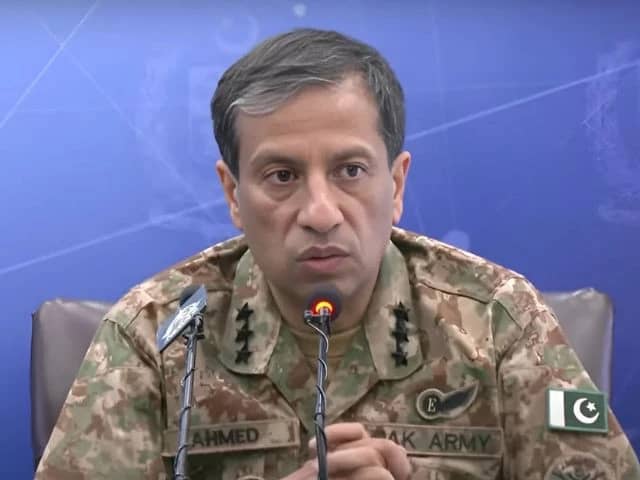In an exclusive discourse with Anadolu Agency, the military spokesperson unequivocally articulated that Pakistan shall in no conceivable circumstance acquiesce to any paradigm of regional subjugation. “Pakistan shall never genuflect before the imperious designs of Indian hegemony,” he proclaimed, adding with emphatic finality, “The more expeditiously India apprehends this immutable reality, the more auspicious it shall prove for the preservation of regional equilibrium and the overarching interests of global stability.”
“India is not the United States, and Pakistan is not Afghanistan. India does not mirror Israel, nor is Pakistan synonymous with Palestine. Pakistan shall never be coerced into submission,” declared the Director General of Inter-Services Public Relations (DG ISPR), Lieutenant General Ahmed Chaudhry. He reaffirmed Islamabad’s resolute dedication to preserving its national sovereignty and contributing to regional equilibrium.
The general further attributed the intensifying tide of extremism and domestic terrorism within India to the state’s internal governance failures, particularly the systemic repression of religious minorities, notably Muslims and Sikhs. “Such repressive policies are engendering internal discord and civil unrest,” he added, alluding to India’s volatile socio-political trajectory.
These unequivocal assertions emerge against the backdrop of New Delhi’s abrupt and unilateral revocation of the decades-old Indus Waters Treaty—a cornerstone of South Asian hydro-diplomacy—following a fatal assault on civilians in Indian-Occupied Jammu and Kashmir (IIOJK). India hastily attributed the attack to Islamabad, a charge which Pakistan has emphatically repudiated.
In the aftermath, tensions escalated precipitously. In early May, Indian armed forces launched extensive cross-border military operations—not confined to the Line of Control (LoC), but extending deep into Pakistan’s sovereign territory—under the pretense of neutralizing insurgent hideouts. In a calibrated and potent counteroffensive, Pakistan retaliated by striking 26 Indian military installations before a ceasefire, brokered by Washington, restored a tenuous calm on May 10.
Yet, tranquility remains ephemeral. Indian Prime Minister Narendra Modi’s inflammatory proclamation this week—to sever Pakistan’s access to its rightful share of Indus river waters—has reignited alarms of impending conflict. For Islamabad, such a maneuver is not merely provocative but tantamount to casus belli.
In an exclusive conversation with Arab News, Lt Gen Chaudhry issued a stark warning: “Any attempt by India to obstruct Pakistan’s water flow would transgress a critical threshold.”
“Only a madman would contemplate depriving over 240 million people of their lifeblood—water,” he remarked. “I hope such a day never arrives, but if it does, the world shall bear witness to the consequences, which will echo through decades of unrest. No entity shall be permitted to strangle Pakistan’s lifelines with impunity.”
In an unprecedented disclosure, the DG ISPR confirmed that the Indian Air Force suffered catastrophic losses during the four-day hostilities—amounting to six downed aircraft, including elite assets such as French-manufactured Rafales, a Mirage 2000, and a prized Russian-origin S-400 air defense system.
Prior estimates had placed Indian losses at five, but Prime Minister Shehbaz Sharif verified the sixth aircraft’s destruction earlier this week. “I can confirm the sixth aircraft was a Mirage 2000,” Chaudhry stated. “We deliberately limited our scope. We had the capacity to neutralize more assets but chose restraint over escalation,” he emphasized.
Looking forward, General Chaudhry issued a sober prognosis: enduring regional peace remains a distant aspiration unless the foundational dispute over Kashmir is resolved through bilateral engagement. “India’s current approach to Kashmir is inherently unsustainable. Until both nations convene in earnest to pursue a mutually agreeable resolution, the specter of conflict will persist,” he asserted.
“Peace Is Our Paramount Objective”
In a separate interaction with RT Arabic, Lt Gen Chaudhry dispelled mischaracterizations surrounding Pakistan’s regional posture. “We are not an aggressor state. We are a dignified, peace-seeking nation,” he declared, according to state broadcaster PTV News.
“Sophisticated nations such as the United States comprehend the temperament and resolve of Pakistan’s populace,” he added.
Revealing intricate diplomatic machinations underpinning the ceasefire following Operation Bunyan-un-Marsoos, Chaudhry disclosed that the overture for de-escalation originated from New Delhi. “India’s own Defence Ministry representative personally initiated a ceasefire request,” he revealed.
“Our national doctrine prioritizes stability. Hence, we agreed in principle,” he said, while lauding the efforts of Pakistan’s diplomatic corps for their strategic acumen during negotiations. “With commendable foresight and diplomatic sophistication, our envoys orchestrated a resolution that underscored Pakistan’s principled stance.”
He cited the precision strikes on Indian military targets—culminating in the destruction of five advanced aircraft—as a testament to Pakistan’s resolve and discipline. “Our armed forces, in unyielding solidarity with the nation, responded with calculated precision,” he remarked.
Reflecting on the crescendo of conflict during May 9–10, Chaudhry detailed India’s escalatory maneuvers: “The enemy launched a barrage of missiles overnight in a brazen attempt at psychological intimidation. But India grievously misjudged our resilience,” he said.
“On the morning of May 10, we retaliated with surgical strikes—exclusively targeting military infrastructure, eschewing civilian harm. This was a meticulously measured, ethical, and proportionate response,” he stated firmly.
“India Rejected Neutral Investigative Oversight”
Readdressing the genesis of the confrontation, DG ISPR emphasized that a comprehensive understanding necessitates contextual clarity. “India obfuscates truth through a facade of fabricated narratives,” he stated, referencing the Pahalgam attack. Despite India’s premature allegations against Pakistan, its own foreign ministry later conceded that a full investigation had yet to be concluded.
“What prudence is there in assigning culpability absent empirical evidence?” he questioned rhetorically.
Pakistan, he added, had advanced a transparent and judicious proposition—calling for an independent, impartial inquiry. “India summarily dismissed our reasonable overture and, instead, unilaterally launched missile strikes on our mosques—resulting in the martyrdom of innocent children, women, and elders,” he asserted.
Affirming the sanctity of Pakistan’s defensive obligations, Chaudhry reiterated: “Defending our sovereignty and territorial integrity is not merely a duty—it is a sacred mandate entrusted to our armed forces, which they have discharged with unflinching resolve.”
He also renewed longstanding allegations implicating India in covert subversion within Pakistan, particularly through support for terrorist proxies. “India remains the primary architect of instability within Pakistan, channeling resources and intelligence to outlawed militant outfits, including the TTP and separatist cells in Balochistan,” he said, explicitly naming the Fitna Al-Khawarij as a recipient of such malign patronage.



